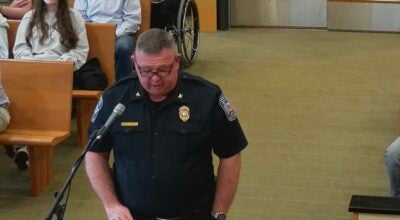No action taken on mining dilemma
Published 6:00 am Friday, December 4, 2020
|
Getting your Trinity Audio player ready...
|
The Buckingham County Planning Commission voted unanimously last Monday, Nov. 23, to table any further discussions of removing mining from A-1 and A-C agricultural districts until more information could be gathered.
Last month the commission heard from a panel of geological experts after public concerns escalated following the discovery that Canadian-based company Aston Bay Holdings had been performing exploratory gold drilling/core sampling for years without the knowledge of county officials.
Citizens were angered both by Aston Bay’s under-the-radar operations and the potential for gold discoveries leading to an open-pit mine.
As core sampling is not a permitted use of an A-1 district, Aston Bay was instructed by the county to temporarily cease operations.
After hearing from experts last month, the Board of Supervisors instructed the commission to schedule a public hearing to take the use of mining with a special use permit out of the A-1 and A-C districts in order to align with the county’s comprehensive plan to maintain Buckingham’s rural integrity.
The board also asked Planning Commission Vice Chair John Bickford to work with County Attorney E.M. Wright Jr. to consider crafting a questionnaire that could be used to have property owners report back to the county with certain information should they lease their land to a company prepared to do core drilling of any kind.
While several members of the public spoke Monday night of the idea of removing mining from agricultural zones, hopes were quickly dashed. In reporting back to the board, Wright expressed his doubt that a questionnaire would work, as the document would likely have no enforcement mechanism, meaning landowners would only have to report leasing their properties to prospectors on a voluntary basis.
Some board members, including Chairman Patrick Bowe, expressed concern in the idea of completely doing away with mining in an agricultural zone.
“You know, this is a very complex subject here, and I’m not sure that the audience realizes what’s at stake here,” Bowe said. “Ninety-five percent of this county is zoned agriculturally, so whatever it is we do is going to affect 95% of the land mass in this county. It’s a rather big decision to be made.”
With a questionnaire effectively out the window and doubts about the mining subject, the commission voted unanimously to table discussions until more information could be gathered on all mining operations in the county.
Commission members also suggested arranging for a second panel of experts to attend an upcoming meeting to provide that information, perhaps in the form of a joint work session with the Board of Supervisors.
Buckingham Planning and Zoning Administrator Nicci Edmondston responded that she would work on reconvening last month’s panel in addition to finding other experts specific to kyanite, slate, gold, copper etc.
Although the public comment period was over and a discussion was not on the agenda, Bowe announced at the end of the meeting that he was inviting citizens to come back up to the podium and participate in an open discussion about the subject of mining and core sampling.
Bowe’s invitation was followed by approximately 30 minutes of discussions between himself and audience members, including county resident Paul Barlowe, who recently took a trip to the Haile open pit gold mine in South Carolina to observe what could become of Buckingham should an open pit mine open in the county.
Barlowe described to the commission his discovery that the majority of homes surrounding the mine had been bought up and leveled by the mining company.
“So there goes a big chunk of your real estate taxes,” Barlowe said.
Resident David Ball told the Planning Commission doing away with mining would be an impossibility as the county already has other mining operations such as Kyanite Mining. Ball said the situation would boil down to what types of mining the county would end up regulating, not getting rid of it as a whole.
Local geologist Joshua Seay told the audience he previously did contract work for Aston Bay. He felt a special use permit for core sampling would be bad for business in a place like Buckingham where mining operations have employed so many residents.
Rob Lanham, an aggregates program manager with the Virginia Transportation Construction Alliance, also cautioned that restrictions put on mining would be applicable to all aggregates, not just gold mining.
“Our mining is the local quarry where you go get the gravel for your driveway. If you don’t have any local (quarries), the cost for your gravel in your driveway is going to go up,” Lanham warned. “I just caution you that when you’re outlawing mining, you’re outlawing all of it.”
At the end of the meeting, commission members accepted a resignation from District 6 representative Chet Maxey. Edmonston explained Maxey had relayed that he had chosen to resign this month due to commitments keeping him from his responsibilities of fully serving. She also stated officials were actively searching for a replacement.




